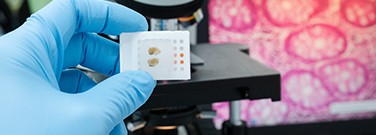Consider a Career in Cytotechnology

By Kylie Wolfe
Do you enjoy exploring the cellular world through a microscope? In the field of cytotechnology, your understanding of cells can help improve patient health. Cytotechnologists study human cell samples, looking for abnormalities like changes in color and shape. Based on their findings, they work with pathologists to identify various diseases, including cancer. Even subtle cellular changes can lead to an early diagnosis and viable treatments.
Those entering this field should be comfortable working independently and assuming responsibility. This position requires excellent attention to detail to help ensure patients receive the most accurate information in a timely manner.
Duties and Skills
As a cytotechnologist, you’ll be tasked with analyzing patient samples to find disease, infection, and inflammation. Once you’ve made your observations, you’ll share them with a pathologist for evaluation. You might also share your findings with a physician in the form of a presentation or report. They’ll determine the patient’s diagnosis and treatment.
In this role, you’ll also be responsible for using and maintaining relevant lab equipment and working with analytical software. Other duties include managing patient cell samples, cataloging them, and keeping information organized.
Most cytotechnologists work in hospital, university, and private laboratories. There are research opportunities and teaching positions available, too. Most work will be completed independently, but it’s important to be able to work well with others. You can expect a traditional 40-hour work week and a demand for quick and accurate data.
Education and Training
To become a cytotechnologist, you must complete a bachelor’s degree in cytotechnology or a different life sciences discipline. According to ExploreHealthCareers.org, here are a few courses you can expect to encounter:
- Mathematics and/or statistics
- Scientific method of inquiry
- Laboratory operations
- Basic laboratory techniques
- Cytologic procedures/technologies
- Ancillary testing and related technologies
- Screening and interpretation
- Professional development
Throughout your degree program, you’ll develop a strong foundation in core math and science areas. You’ll learn about microbiology, immunology, genetics, and cytology.
The education requirements for this role generally take four to five years to complete and often include an internship or period of specialized training. All graduates must take and pass the American Society for Clinical Pathology Board of Registry national certification.
Compensation and Job Outlook
The salary for a cytotechnologist varies based on location and experience level. According to the American Society for Clinical Pathology, the average annual salary in this field can range from $74,000 to $91,000. These numbers might look different for entry level positions but express room for financial growth.
The U.S. Bureau of Labor Statistics projects 11 percent job growth in this field between 2020 and 2030. Because technology is constantly evolving, there are opportunities to learn new techniques throughout your career.
If you’re looking for a comparable field, cytogenetic technologists complete similar tasks, but they focus on DNA mutations. Either way, you can have a hand in patient diagnoses and their long-term health.
How Can I Prepare Myself?
To prepare for a career in cytotechnology, take high school math and science courses, including statistics, biology, chemistry. Look for opportunities to explore more specific disciplines, like cytology and immunology. It’s also helpful to research university programs and summer opportunities for hands-on lab experience.
To learn more about cytotechnology careers, visit:

